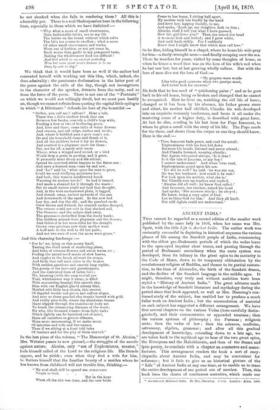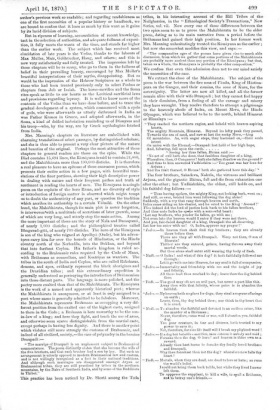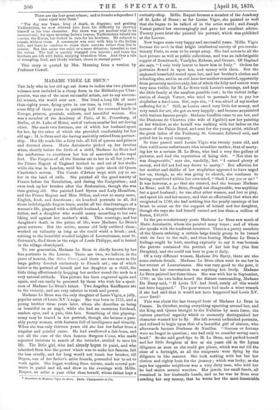ANCIENT INDIA.*
Tilts cannot be regarded as a second edition of the smaller work published by the same lady in 1856, when her name was Mrs. Speir, with the title Life in Ancient India. The earlier work was eminently successful in depicting in historical sequence the various phases of life among the Sanskrit people of India, commencing with the oldest pre-Brahmanic periods of which the vedas leave to the open-eyed inquirer clear traces, and passing through the period of Brahmanic ascendancy when the caste system was developed, from its infancy in the ghat epics to its maturity in the Code of Mann, down to its temporary obliteration by the revolutionary religion of Buddha, and thence to its partial restora- tion, to the time of Alexander, the birth of the Sanskrit drama, and the decline of the Sanskrit language in the middle ages. It might, therefore, very truly and without ambition have been styled a " History of Ancient India." The great advance made in the knowledge of Sanskrit literature and mythology during the period since that book appeared, as well as Mrs. Manning's con- tinued study of the subject, has enabled her to produce a much fuller work on Ancient India ; but the accumulation of material on each subject has suggested a different arrangement. We have first several chapters on the various Vedas (here carefully distin- guished), and their commentaries or appended treatises ; then the various systems of philosophy ; the Puranas ; religiotis sects ; then the codes of law ; then the sciences, medicine, astronomy, algebra, grammar ; and after all this gradual development of knowledge, extending down to a late age, we are taken back to the mythical age to hear of the two great epics, the Ramayana and the Maliabharata, and then of the drama and lyric poetry, to conclude with a chapter on commerce and manu- factures. This arrangement renders the book a sort of ency- clopaedia about Ancient India, and may be convenient for reference ; but it fails to give us an historical picture of the " Life " of Ancient India at any one time, or to enable us to trace the entire development of one period out of another. Thus, this book loses the charm of continuous narrative, which made our • Ancient and Media:rat India. By Mrs. Manning. 2 vols. London : Allen. 1869.
author's previous work so readable ; and regarding readableness as one of the first necessities of a popular history or handbook, we are bound to confess that it loses as much by this want as it gains by its lucid division of subjects.
But in ripeness of learning, accumulation of recent knowledge, tact in the selection of authorities, and adequate fullness of exposi- tion, it fully meets the wants of the time, and stands far higher than the earlier work. The subject which has received most elucidation of late years is the Vedas, thanks to the labours of Max Muller, Muir, Goldstiicker, Hang, and others; and this is now very satisfactorily and fully treated. The impression left by these chapters will be to many, who go to them in the fullness of belief in their prevailing beauty, encouraged by Max Miiller's beautiful interpretations of their myths, disappointing. But so would be the impression of the Hebrew Scriptures as a whole to those who had been treated previously only to select Psalms or
chapters from Job or Isaiah. The horse-sacrifice and the Soma rites speak as little to our hearts as the Levitical sacrificial laws and provisions regarding leprosy. It is well to know more of the contents of the Vedas than we have done before, and to trace the gradual development of a system, which commenced with a cycle of gods, who were afterwards as utterly dethroned in India as was Father Kronos in Greece, and adopted afterwards, in the Soma, a kind of deified inebriation reminding us of Dionysus and his troop—who, by the way, are by Greek mythologists fetched
from India.
Mrs. Manning's chapters on literature are embellished with charming translations of select passages, by distinguished scholars; and she is thus able to present a very clear picture of the nature and beauties of the original. Perhaps the most attractive of these chapters to general readers are those on the epics. While the Iliad contains 15,694 lines, the Ramayana is said to contain 24,000, and the Mahabharata more than 100,000 distichs. It is therefore a real pleasure to have an epitome of these enormous poems, which presents their entire action in a few pages, with beautiful tran- slations of the finer portions, showing their high descriptive power in dealing with nature and their frequent pathos and truth of sentiment in reading the hearts of men. The Ranuiyana is a single poem on the exploits of the hero Rama, and no diversity of style or introduction of foreign matter is observed which might tempt us to doubt the authenticity of any part, or question the tradition which ascribes its authorship to a certain Vdlmiki. On the other hand, the Mahabharata, though its main plot is never forgotten, is interwoven with a multitude of accretions of later growth, some of which are very long, and utterly stop the main action. Among the more important of these are the story of Nala and Damayanti, of nearly 1,000 distichs ; and the philosophical treatise called Bhagavad-gita, of nearly 700 distichs. The hero of the Ramayana is son of the king who reigned at Ayodhya (Dude), but his adven- tures carry him far over the bounds of Hindustan, or the Hindu country north of the Nerbudda, into the Dekkan, and beyond that into farthest Ceylon. His father's kingdom is ruled ac- cording to the Brahmanic rules required by the Code of Mann, with Brahmans as counsellors, and Ksatriyas as warriors. The tribes in the south of India and Ceylon, who are called Rakshasas, demons, and apes, evidently represent the black aborigines and the Dravidian tribes; and this extraordinary expedition is generally understood as portraying the introduction of Brahmanism into those distant parts. The language is more polished, and the poetry more exalted than that of the Mahabharata. The Ram ayana is the work of a named and apparently historical poet ; whereas the Mahabharata is anonymous, or at least is only assigned to a poet whose name is generally admitted to be fabulous. Moreover, the Mahabharata represents Brahmans as occupying a very dif- ferent position from the exalted one of the highest caste, assigned to them in the Code ; a Brahman is here unworthy to be the son- in-law of a king ; and here they fight, and teach the use of arms, and otherwise seem scarce distinguishable from the martial caste, except perhaps in having leas dignity. And there is another point which violates still more strongly the customs of Brahmanic, and indeed of all civilized, society,—the case of polyandry in the heroine Draupadi :-
" The marrige of Dranpadi is an unpleasant subject to Brahmanical commentators. The poem distinctly states that she became the wife of the five brothers, and that each brother had a son by her. But such an arrangement is utterly opposed to modern Brahmanical law and custom, and is not willingly recognized as a fact in their national traditions. And although such marriages are disapproved amongst Aryan or Brahmanical tribes, they are still practised by tribes in the northern mountains, by the Nairs of Southern India, and by some of the Buddhists in Thibet."
This practice has been noticed by Dr. Shortt among the Toda
tribes, in his interesting account of the Hill Tribes of the Neilgherries, in the " Ethnological Society's Transactions," New Series, vol. vii. Now every one of those differences between the two epics seem to us to prove the Mahabharata to be the older poem, dating as to its main narrative from a period before the Brahmans had gained their high position. In her former work Mrs. Manning unhesitatingly treated the Ramayana as the earlier ; but now she somewhat modifies this view, and says :— " The comparative ages of tho poems have given rise to much able discussion, from which wo gather that some portions of the Mahabharata are probably more ancient than any portion of the Ramayana ; but that, taken as a whole, the Ramayana is probably the older composition."
We confess that oven this admission does not to our mind satisfy the necessities of the case.
We extract the close of the Mahabharata. The subject of the poem is the war between the five sons of Pdndu, King of Hastiva- pura on the Ganges, and their cousins, the sons of Kuru, for the sovereignity. The latter are now all killed, and all the former remain alive with their wife Draupadi ; but they cannot feel happy in their dominion, from a feeling of all the carnage and misery they have wrought. They resolve therefore to attempt a pilgrimage to the heavenly abode of Indra, on Mount Meru, the Hiudu Olympus, which was believed to be to the north, behind llimavat or Himalaya :- "They reached the northern region, and behold with heaven-aspiring hearts, The mighty Mountain, Himavat. Beyond its lofty peak they passed, Towards the sea of sand, and saw at last the rocky Meru,—king
Of mountains. As, with eager steps, they hastened on,—their souls intent On union with the Eternal,—Draupadl lost hold of her high hope, And, faltering, fell upon the earth " Seeing her thus fallen, Bbima said :- ' No act of evil hath sho done, that faultless daughter of a king, Wherefore, then, 0 Conqueror ! bath she fallen thus low on the ground ?'
And thus to him answered Yudhisthira Too great was her love for Aril= ;
And the fruit thereof, 0 Mims ! bath sho gathered hero this day.' "
The four brothers, Sahadeva, Nakula, the virtuous and brilliant Arjuna, and the gigantic Bhiina, fall and die from exhaustion one after the other; but Yudhishthira, the eldest, still holds on, and his faithful dog follows :-
"Thus having spoken, the mighty King, not looking back, wont on ; And still, as ever, behind him went following the dog alone!
Suddenly, with a cry that rang through heaven and earth,
Indra came riding on his chariot, and he cried to the King Ascend!' Then indeed did the lord of justice look back to his fallen brothers, And thus unto Indra ho spoke with a sorrowful heart:
' Let my brothers, who yonder lie fallen, go with mo ;
Not even into thy heaven would I enter if they woro not there, And you, fair-faced daughter of a king, Draupadi the all-deserving, Let her too enter with us! 0, Indra, approve my prayer ! '
"Indra.—In heaven thou shalt find thy brothers ; they are already there before thee.
There are they all with Draupadi. Weep not then, 0 son of Bharata!
Thither are they entered, prince, having thrown away their mortal weeds.
But thou alone shall enter still wearing thy body of flesh. "Yudh.— 0 Indra! and what of this dog ? it hath faithfully followed me through : Let it go with me into Heaven, for my soul is full of compassion. "Indra.—Immortality and friendship with me and the height of joy and felicity,
All these hast thou reached to day ; leave then the dog behind thee.
"Yudh.— The good may oft act an evil part, but never a part like this. Away then with that felicity, whose price is to abandon the faithful.
"Indra.—My heaven hath no place for dogs; they steal away our offerings on earth ;
Leave, then, thy dog behind thee ; nor think in thy heart that it is cruel.
"Yudh.— To abandon the faithful and devoted is an endless crime, like the murder of a Brahman ;
Never, therefore, come weal or woe, will I abandon you, faithful dog.
Yon poor creature, in fear and distress, bath trusted to my power to save it Not, therefore, for e'en life itself will I break my plighted word ! "Indra.—If a dog but beholds a sacrifice, mon esteem it unholy and void ; Forsake then tho dog, 0 hero ! and heaven is thine own as a reward.
Already thou but borne to forsake thy fondly loved brothers and Dranpadi, Why then forsakest thou not the dog ? wherefore now fails thy heart ?
"Yudh.— Mortals, when they are dead, are dead to love or hate ; so runs the world's belief.
I could not bring them back to life, but while they lived I never left them.
To opppress the suppliant, to kill a wife, to spoil a Brahman, and to betray one's friends,—
These are the four great crimes ; and to forsake a dependant I count equal unto them."
"The dog was Yams, king of death, in disguise ; and praising Yudhishthira, he now relieved him from his difficulty by showing himself in his true character. But there was yet another trial to be encountered ; for upon entering Indra's heaven, Yudhishthira beheld his cousins, the Rums, but looked in vain for his brothers. He refused to remain without them. A messenger was sent with him to the Indian hell; and there be resolves to share their sorrows rather than live in heaven. But this scene was nuiyti, or a mere delusion; intended to test his virtue. The hell is quickly changed into heaven ; and there the brothers are loft with Indra, enjoying boundless bliss. And thus a tale of wrangling, feud, and bloody warfare, closes in eternal peace."
This story is quoted by Mrs. Manning from a version by Professor Cowell.
































 Previous page
Previous page